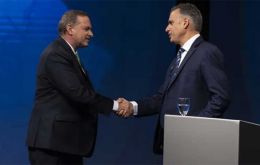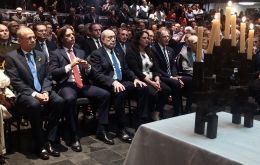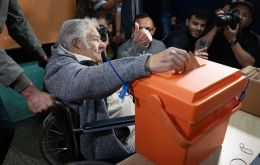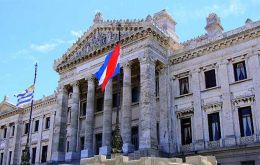MercoPress. South Atlantic News Agency
Tag: Álvaro Delgado
-
Monday, July 21st 2025 - 20:13 UTC
Álvaro Delgado to leave Uruguayan Senate to fully commit himself to the National Party

Former Uruguayan presidential candidate Álvaro Delgado announced that he will resign from the Senate and devote himself exclusively to his role as National Party chairman. The party leadership welcomed his decision. Former Transport Minister José Luis Falero will replace him at the Upper House.
-
Monday, June 30th 2025 - 10:33 UTC
Delgado chosen to chair Uruguay's National Party

Former presidential candidate Álvaro Delgado was elected chairman of Uruguay's National Party (PN) board of directors this weekend, narrowly defeating fellow Senator Javier García by 202 votes to 184 amid boos blaming him from the recent loss to President Yamandú Orsi. Luis Alberto Heber and Carlos Enciso received 45 and 33 votes, respectively.
-
Monday, November 25th 2024 - 11:19 UTC
Yamandú Orsi elected President of Uruguay, marking left's return to power

Uruguay has elected Yamandú Orsi of the Frente Amplio (FA) as its next president, bringing the left back to power after five years of conservative rule. Orsi secured 49.8% of the vote against 45.9% for Álvaro Delgado of the National Party, a margin of 92,000 votes, according to official results. The outgoing president, Luis Lacalle Pou, promptly congratulated Orsi, stating he was ready to facilitate a smooth transition.
-
Monday, November 18th 2024 - 08:40 UTC
Uruguayan presidential candidates hold key debate one week before runoff

At a time when all polls indicate that former Canelones Mayor (Governor) Yamandú Orsi of the opposition Broad Front (Frente Amplio - FA) is the frontrunner for Uruguay's Nov. 24 runoff against Álvaro Delgado of the ruling National Party and Multicolor coalition, both candidates held the mandatory debate on Sunday evening, during which they reviewed human development, security, economy, knowledge, and labor.
-
Tuesday, November 12th 2024 - 06:18 UTC
Kristallnacht remembered in Uruguay by the entire political spectrum

Representatives of Uruguay's Government as well as the opposition got together Monday to commemorate the infamous Night of Broken Glass perpetrated by Nazi Germany on Nov. 9-10, 1938, which was rekindled by last week's pogrom against Israeli football fans in Amsterdam.
-
Monday, October 28th 2024 - 10:55 UTC
Uruguay’s Presidential race heads to runoff as Orsi's Frente Amplio leads first round

Uruguay’s leftist Frente Amplio (FA) secured the top position in the first round of the presidential election. Yamandú Orsi, the FA candidate and former mayor of Canelones, led the race with 43.4% of the vote, propelled by support from former president José “Pepe” Mujica. However, he fell short of the majority threshold needed to avoid a runoff, and a second round is now scheduled for November 24. Orsi’s opponent in the runoff will be Álvaro Delgado, the National Party (PN) candidate, who garnered 27.2% of the vote and leads a coalition of center-right and right-wing parties that include the Colorado Party and Cabildo Abierto.
-
Sunday, October 27th 2024 - 21:55 UTC
Uruguay's 2024 Election: Voter turnout reaches 40% by midday, anticipating a close race

As Uruguayans head to the polls this October 27 to elect their president, vice-president, and Parliament, preliminary reports from the Electoral Court indicate a steady turnout. By midday, 40% of the 2,727,120 eligible voters had cast their ballots across the country's 7,276 polling circuits. Voting is mandatory in Uruguay, with those abstaining required to pay a fine or present a valid excuse, such as illness, disability, or international travel.
-
Thursday, October 24th 2024 - 11:05 UTC
What the polls say three days before the presidential elections in Uruguay

Uruguayans will head to the polls on October 27 to elect a successor to President Luis Lacalle Pou and renew the country's Parliament. According to the latest surveys, no candidate is expected to secure the required 50% of votes, setting the stage for a November runoff.
-
Monday, October 14th 2024 - 17:47 UTC
In a dull campaign and dull candidates, Uruguay votes new president and parliament on Sunday October 27

In less than two weeks time, Sunday 27 October, 2,8 million Uruguayan voters will be electing a new president, and a new parliament, 99 Lower House members and 30 Senators for the 2025/2030 period.
-
Monday, October 14th 2024 - 10:43 UTC
Swing voters to prove decisive in Uruguayan elections, poll finds

According to a Cifra survey released this weekend in Montevideo, Uruguay has 11% of swing voters who could end up pivotal in Oct. 27's presidential elections. Hence, political parties should focus on winning them over, the pollsters underlined. Cifra Director Mariana Pomiés underlined that this number could tip the scale at the end of the day.
